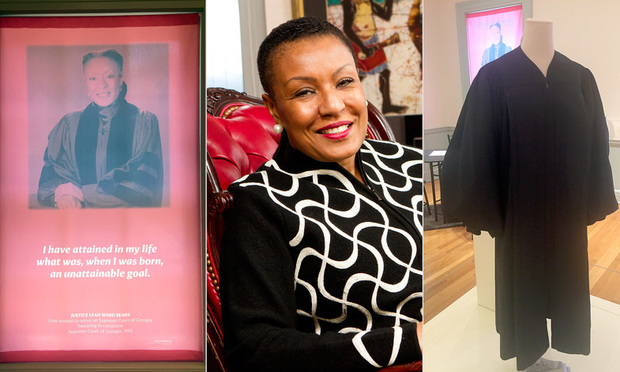Atlanta History Center Features Sears in Exhibit on Women's Voting Rights and Political Muscle
Smith Gambrell partner Leah Ward Sears is featured in an exhibit centered around the 100th anniversary of women winning the right to vote.
August 29, 2019 at 05:50 PM
5 minute read
 Items in the Atlanta History Center exhibit relating to Leah Ward Sears (center) are on display in the Atlanta History Center exhibit in the Swan House..
Items in the Atlanta History Center exhibit relating to Leah Ward Sears (center) are on display in the Atlanta History Center exhibit in the Swan House..
Leah Ward Sears has made history, again.
Sears became the first woman justice—and the youngest—on the Supreme Court of Georgia in 1992.
She is featured in a new Atlanta History Center exhibit that commemorates the upcoming 100th anniversary of women winning the right to vote. The exhibit also documents how women have gained and used political power since then.
The exhibit, "Any Great Change: The Centennial of the 19th Amendment," opened Aug. 16 and will run through January 2021. The title references a quotation by suffragist and abolitionist Lucretia Coffin Mott who in 1953 said, "Any great change must expect opposition." Congress passed the 19th Amendment in 1919, and it was ratified Aug. 18, 1920.
Sears' robe and other memorabilia from her career on the bench are displayed in the latter part of the exhibit, which looks at Georgia women in politics after gaining the vote, both as elected officials and organizers. A portrait of Sears in her judicial robe quotes her saying, "I have attained in my life what was, when I was born, an unattainable goal."
Now a partner at Smith Gambrell & Russell, Sears was appointed to the Supreme Court bench at age 36 by Gov. Zell Miller. Four years earlier, she was the first African American woman to become a Fulton County Superior Court judge.
Sears continued to be reelected to the Supreme Court bench. That included several contested races. The first was in 1992 against Judge Steven Boswell of Clayton County Superior Court. Sears' victory made her the first woman elected statewide in a contested Georgia election. Another was a hotly contested race in 2004 against an opponent, Grant Brantley, who was backed by the Georgia Christian Coalition and the Georgia Republican Party.
"I am honored to be included among the women who impacted Georgia through my service as an elected jurist," Sears said in a statement.
Sears served as the Supreme Court's chief justice from 2005 until she retired in 2009 and returned to private practice.
While on the bench, she established the Committee on Civil Justice to provide access to justice for low-income and unrepresented Georgians and the Commission on Children, Marriage and Family Law to better protect families.
At Smith Gambrell, Sears handles appellate matters, serves as a mediator and arbitrator and advises on internal investigations and other sensitive matters. She continues to take an active role in civic life. Mayor Keisha Lance Bottoms tapped her last spring to chair the new Atlanta Task Force for the Promotion of Public Trust.
"Any Great Change" is housed at the Swan House, now owned by the Atlanta History Center. The exhibit also spotlights the Swan House's original owners, Emily MacDougald and her daughter Emily Inman, who were both notable suffragettes. MacDougald was the president of the Equal Suffrage Party of Georgia, and Inman participated in Atlanta suffrage parades.
The exhibit's lead curator, Jessica VanLanduyt, said in a statement that the exhibit acknowledges that the struggle for voting rights has continued into the present for women and people of color. "The woman suffrage movement is one of many voting rights struggles in the nation's history," VanLanduyt said. "Voting secures many of the key benefits of a democratic process: I want to have a say. I want representatives that reflect my values and me. I want laws to ensure my equality."
The major funder for the "Any Great Change" exhibit is Emily Bourne Grigsby, a pioneering lawyer in her own right. Grigsby earned a law degree in 1982, at age 60, from the Woodrow Wilson College of Law and went on to practice as an arbitrator and mediator. Grigsby had already earned a master's degree in city planning from Georgia Tech in 1975 after a first career modeling clothing for Rich's Department Store. She has also been a painter for more than 30 years.
This story has been corrected to reflect that Sears was 36 when appointed to the Georgia Supreme Court and that she ran several contested judicial races, not just one. Also, the exhibit runs until January 2021.
This content has been archived. It is available through our partners, LexisNexis® and Bloomberg Law.
To view this content, please continue to their sites.
Not a Lexis Subscriber?
Subscribe Now
Not a Bloomberg Law Subscriber?
Subscribe Now
NOT FOR REPRINT
© 2025 ALM Global, LLC, All Rights Reserved. Request academic re-use from www.copyright.com. All other uses, submit a request to [email protected]. For more information visit Asset & Logo Licensing.
You Might Like
View All
Law Firms Expand Scope of Immigration Expertise Amid Blitz of Trump Orders
6 minute read
Losses Mount at Morris Manning, but Departing Ex-Chair Stays Bullish About His Old Firm's Future
5 minute read
Bass Berry & Sims Relocates to Nashville Office Designed to Encourage Collaboration, Inclusion
4 minute read
Gunderson Dettmer Opens Atlanta Office With 3 Partners From Morris Manning
3 minute readTrending Stories
- 1Uber Files RICO Suit Against Plaintiff-Side Firms Alleging Fraudulent Injury Claims
- 2The Law Firm Disrupted: Scrutinizing the Elephant More Than the Mouse
- 3Inherent Diminished Value Damages Unavailable to 3rd-Party Claimants, Court Says
- 4Pa. Defense Firm Sued by Client Over Ex-Eagles Player's $43.5M Med Mal Win
- 5Losses Mount at Morris Manning, but Departing Ex-Chair Stays Bullish About His Old Firm's Future
Who Got The Work
J. Brugh Lower of Gibbons has entered an appearance for industrial equipment supplier Devco Corporation in a pending trademark infringement lawsuit. The suit, accusing the defendant of selling knock-off Graco products, was filed Dec. 18 in New Jersey District Court by Rivkin Radler on behalf of Graco Inc. and Graco Minnesota. The case, assigned to U.S. District Judge Zahid N. Quraishi, is 3:24-cv-11294, Graco Inc. et al v. Devco Corporation.
Who Got The Work
Rebecca Maller-Stein and Kent A. Yalowitz of Arnold & Porter Kaye Scholer have entered their appearances for Hanaco Venture Capital and its executives, Lior Prosor and David Frankel, in a pending securities lawsuit. The action, filed on Dec. 24 in New York Southern District Court by Zell, Aron & Co. on behalf of Goldeneye Advisors, accuses the defendants of negligently and fraudulently managing the plaintiff's $1 million investment. The case, assigned to U.S. District Judge Vernon S. Broderick, is 1:24-cv-09918, Goldeneye Advisors, LLC v. Hanaco Venture Capital, Ltd. et al.
Who Got The Work
Attorneys from A&O Shearman has stepped in as defense counsel for Toronto-Dominion Bank and other defendants in a pending securities class action. The suit, filed Dec. 11 in New York Southern District Court by Bleichmar Fonti & Auld, accuses the defendants of concealing the bank's 'pervasive' deficiencies in regards to its compliance with the Bank Secrecy Act and the quality of its anti-money laundering controls. The case, assigned to U.S. District Judge Arun Subramanian, is 1:24-cv-09445, Gonzalez v. The Toronto-Dominion Bank et al.
Who Got The Work
Crown Castle International, a Pennsylvania company providing shared communications infrastructure, has turned to Luke D. Wolf of Gordon Rees Scully Mansukhani to fend off a pending breach-of-contract lawsuit. The court action, filed Nov. 25 in Michigan Eastern District Court by Hooper Hathaway PC on behalf of The Town Residences LLC, accuses Crown Castle of failing to transfer approximately $30,000 in utility payments from T-Mobile in breach of a roof-top lease and assignment agreement. The case, assigned to U.S. District Judge Susan K. Declercq, is 2:24-cv-13131, The Town Residences LLC v. T-Mobile US, Inc. et al.
Who Got The Work
Wilfred P. Coronato and Daniel M. Schwartz of McCarter & English have stepped in as defense counsel to Electrolux Home Products Inc. in a pending product liability lawsuit. The court action, filed Nov. 26 in New York Eastern District Court by Poulos Lopiccolo PC and Nagel Rice LLP on behalf of David Stern, alleges that the defendant's refrigerators’ drawers and shelving repeatedly break and fall apart within months after purchase. The case, assigned to U.S. District Judge Joan M. Azrack, is 2:24-cv-08204, Stern v. Electrolux Home Products, Inc.
Featured Firms
Law Offices of Gary Martin Hays & Associates, P.C.
(470) 294-1674
Law Offices of Mark E. Salomone
(857) 444-6468
Smith & Hassler
(713) 739-1250






